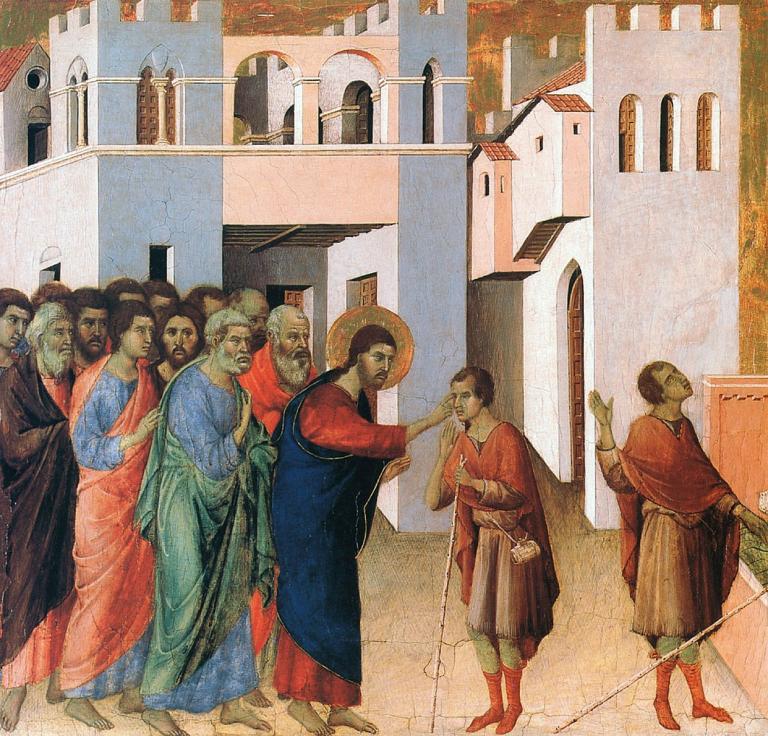
A distinguished medical doctor shared a keen insight yesterday about caring for people with disabilities. He realized years ago that what he needed to know about caring for people with disabilities was that he didn’t know anything about them. So, he determined that he needed to listen humbly to people with disabilities tell him what he needed to know to care for them. Otherwise, he would be guilty of bad diagnoses and prescriptions (You can find my video-taped interview with this medical doctor at the close of this blog post).
The preceding account reminds me of a story in Luke’s Gospel. Christian tradition maintains that Luke was a medical doctor. I wonder if Luke learned something about Jesus’ bedside manner in caring for people with disabilities based on Jesus’ response to a blind beggar in Luke 18:
As he drew near to Jericho, a blind man was sitting by the roadside begging. And hearing a crowd going by, he inquired what this meant. They told him, “Jesus of Nazareth is passing by.” And he cried out, “Jesus, Son of David, have mercy on me!” And those who were in front rebuked him, telling him to be silent. But he cried out all the more, “Son of David, have mercy on me!” And Jesus stopped and commanded him to be brought to him. And when he came near, he asked him, “What do you want me to do for you?” He said, “Lord, let me recover my sight.” And Jesus said to him, “Recover your sight; your faith has made you well.” And immediately he recovered his sight and followed him, glorifying God. And all the people, when they saw it, gave praise to God (Luke 18:35-43; ESV).
No doubt, Luke was struck by Jesus’ response to the blind man. He contrasts the reaction of the crowd with Jesus’ response to the blind man’s cry for help. Not only does Jesus not tell the blind man to be silent, but also he asks the blind man what he wants Jesus to do for him.
I find this an amazing story. Jesus was surrounded by a great number of people who probably requested and demanded all kinds of things from him. And yet, no matter how much they pressed him, this man left an impression on Jesus. So, rather than ignoring the blind man and passing by him, Jesus stopped in his tracks. And while Jesus could have quickly acted in the attempt to care for the man, he first asked the blind man what he wanted Jesus to do for him. Jesus listened humbly instead of imposing his will.
You may think Jesus knew what the blind man wanted and could have acted immediately without inquiring and waiting for a response. Whether Jesus knew what the blind man wanted is not as important as Jesus asking the blind man an open question. Jesus took time to interact with the blind man. After healing him, the blind man followed Jesus.
I wonder if the crowd became clear-sighted as a result of Jesus stopping rather than ignoring, asking, listening and then answering the blind man in direct response to his need. Remember that this crowd had rebuked the blind man and told him to be quiet. Yes, they glorified God when Jesus healed the man. But what happened the next time the crowd encountered a blind or deaf person on the road? Did the crowd create access and invite them into Jesus’ presence?
There is more to Doctor Luke’s account, and the account of the medical doctor I mentioned at the outset of the post. Just think how courageous and resilient the blind man must have been to not allow the crowd to silence him. He persisted, and as a result of his faith, Jesus awarded him with sight. The blind man appeared to know more about Jesus than the crowd. Whereas the crowd thought Jesus could not be bothered with a blind beggar, the blind man perceived that Jesus was unbelievably merciful and would care for his need if he could only hear his cry. Do you and I persist, or do we allow the crowd to silence us?
The doctor mentioned at the beginning of this post informed me of a patient who was a paraplegic. Reminiscent of the blind man in Luke’s account, this disabled person was very assertive. He told the doctor: “We disabled people know more about life than you will ever know.” The doctor agreed. As with Luke apparently, this doctor realizes how remarkable many people in the disability community are. They are spiritual giants who have demonstrated resilience and triumphed over incredible challenges with great faith.
If we are passing by the disabled people on the way to work or school or church, we will also pass by Jesus, Luke and my medical doctor friend. If we don’t stop to listen humbly, ask open questions, and see their resilience and courage, we are dim-witted and dumb. We need them to open our eyes so we can really see and unplug our ears so we can really hear.












